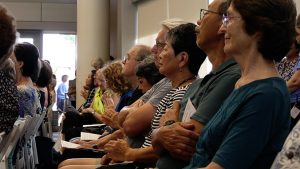
Hundreds of Hawaiʻi residents who participated in the largest cancer study of its kind attended an event to celebrate the 25th anniversary of the Multiethnic Cohort (MEC) Study.
Since 1993, participants have been sharing their health information with the University of Hawaiʻi Cancer Center and the Keck School of Medicine at the University of Southern California in the most ethnically diverse epidemiologic study in the world.
About 215,000 participants ages 45–75 in Hawaiʻi and California helped investigate the roles that lifestyle, diet and genetics play in cancer and other chronic diseases.
“The MEC Study is being conducted to understand the differences in risk that exist for cancer and other chronic diseases among the main ethnic/racial groups living in Hawaiʻi and California,” said Loïc Le Marchand, UH Cancer Center epidemiologist and principal investigator of the study.
The event gave Hawaiʻi participants a chance to learn about how their participation has become a trove for findings relating to cancer research. The MEC Study has resulted in more than 600 published scientific articles on topics including smoking, diet, alcohol, coffee, meat cooking methods, physical activity, hormones, reproductive factors, genetics, inflammation, infections, sleep, air pollution, gut microbes, obesity and diabetes.
“I feel like Iʻve done something to really contribute to finding a cure,” study participant Leona Pereza said. “I’ve wanted to be part of this study for several reasons. In my family, my mother, my maternal grandmother and also my mother-in-law all were victims of breast cancer.”
The MEC Study has brought more than $150 million in federal research funding to UH. It has been funded since 1993 by the National Cancer Institute.
“We are proud to lead a study with such significant impact at the UH Cancer Center. The MEC study has gained national and international recognition among biomedical scientists, and is an example of the world-class research conducted at the University of Hawaiʻi,” said Randall Holcombe, UH Cancer Center director.
The participants completed a questionnaire on their lifestyle, medical history and habits. Every five years participants would follow up with more information to the study.

